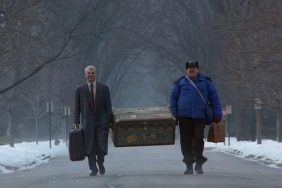[The following article contains SPOILERS for Die Hard. Obviously.]
A Christmas Tradition
In 1988, Die Hard became a hit at the summer box office and turned Bruce Willis into an action hero. It wasn’t just a fleeting sensation. Because it was so well constructed and executed, it has continued to entertain fans for 26 years, even those who have seen it over and over again and already know the firehose is going to pull McClane (Willis) back out the window, and that Karl (Alexander Godinov) is going to come back in the end.
Because it was set at Christmastime, an action motif popularized by Shane Black in the previous year’s Lethal Weapon (also produced by Joel Silver), Die Hard fans have taken to revisiting the film not on the anniversary of its release, but as a Yuletide tradition.
Not that you need any excuse to watch Die Hard. It’s one of the greatest movies of all time, not just one of the greatest action movies. The construction of each floor of Nakatomi Tower grounds the viewer in a sense of geography. Director John McTiernan and production designer Jackson DeGovia were smart to give us visual landmarks on each floor. The suspense is so steady that you could join the film at any point and fall right into its tension. (Okay, that may be because many of us know Die Hard by heart by now.) The one-liners are never not funny either.
Yes, there is something irreverent about watching Die Hard along with or instead of It’s a Wonderful Life or Miracle on 34th Street. It’s the sort of thing John McClane would do, but when you turn it on, it does feel right. From beginning to end, Die Hard captures the Christmas spirit, whether by McClane’s Santa-hatted message about his possession of a machine gun to the closing credits set to “Let It Snow.” It wouldn’t endure every December were it not a legitimate Christmas film.
The Debate is Raised
It all started with a short Buzzfeed post by Katie Natotopoulos last year. Matt K. Lewis of The Daily Caller and Sonny Bunch of the Washington Free Beacon then elaborated, making a coherent case for why Die Hard is NOT a Christmas movie.
We support healthy debate, and may even be a little jealous that Lewis and Bunch certainly forged the path in raising the Die Hard issue. It might have been a one-time only headline grabber for the year 2013, but the articles have regained traction this year, thanks in part to Die Hard screenwriter Steven E. De Souza retweeting Bunch’s article again on November 28.
So, in the spirit of exploring a holiday tradition, and because now I really can’t stop thinking about it, I will make the case that Die Hard is, in fact, a Christmas movie. I’m certainly not going to pick on the clever writers who challenged a commonly held notion. If anything, it is a testament to the original authors that the debate lives on. But debate is what we’re supposed to do, and now I’m going to do it.
Point #1: ‘Die Hard’ IS about Christmas

The main point in all of these articles is that a Christmas movie needs to be about Christmas, and Die Hard is about a terrorist plot first and foremost. Or is it? Die Hard is about John McClane visiting his estranged wife Holly (Bonnie Bedelia) at her new office in Los Angeles, where she has also taken the kids. He hopes to patch things up. Now what is more Christmas than family, and forgiving family for past mistakes?
Lewis acknowledges this in his article, but suggests McClane could have just as easily visited at Thanksgiving or spring break. True, but the filmmakers chose to set the visit at Christmas. Family is surely enough to drive other Christmas classics like Christmas Vacation and Home Alone.
In the former, we meet the extended Griswold family for the first time during a Christmas visit. There is a minor subplot about Clark (Chevy Chase)’s Christmas bonus, and Clark is maniacally dedicated to putting on the best family Christmas in town, but that is all dictated by the simple creative decision to make it Christmas vacation, not Thanksgiving. (For a great Thanksgiving movie, check out the Jodie Foster-directed Home for the Holidays, which feature a definitive Robert Downey Jr. performance.)
Home Alone is also about Kevin McCallister (Macauley Culkin) missing his family at the holidays, a theme on which I call bullshit because that family treated him like crap and he proved to be totally self-sufficient on his own. But going by Lewis’s definition, Home Alone isn’t really about Christmas. It’s about Kevin defending his house from burglars, the family-friendly equivalent of a terrorist plot. They could have left him home alone over Thanksgiving or summer vacation, but the filmmakers chose Christmas. If Die Hard isn’t about Christmas, a lot of Christmas movie classics aren’t either.
Point #2: ‘Die Hard’ is Even More Christmas Than You Think

Those looking for deeply celebratory Christmas movies, “die hard Christmas fans” if you will, may want a Christmas movie to go further into the holiday iconography or religious themes. That’s fine, and hardcore Christmas movies are readily available, but Christmas may be more integral to the plot of Die Hard than Bunch and Lewis considered. If Die Hard is first and foremost an action movie, the terrorists actually add to the Christmas story rather than subtract from it. You may wish to qualify it as a “Christmas Action Movie” but that still plants it firmly in the Christmas category.
Hans Gruber’s plot requires it to be the Christmas holiday. He needs to be sure that Nakatomi president Joseph Takagi (James Shigeta) is there, which wouldn’t necessarily be true most nights. The Christmas party also ensures that he’ll have a large group of hostages for leverage. A takeover during business hours might have been possible but he would probably have had increased security to deal with, and a stronger law enforcement presence. But Gruber also had a dramatic flair, hence posing as terrorists in the first place to cover up his heist.
A key part of Gruber’s plan involved getting the FBI to order the power cut off to Nakatomi Tower so that the vault could be opened. They would surely have been less likely to resort to a full blackout during a non-holiday where it would impact millions of businesspeople and residents in the area. Granted, these are my own analyses of the plot. Gruber doesn’t say “Christmas Christmas Christmas” throughout the movie, but it’s implied. It’s subtext.
Point #3: What IS a Christmas Movie, Anyway?

Lewis says “The holidays must be an integral part of the storyline.” This is a problematic definition, and rather superficial when it comes to defining a genre, almost like using a word to define itself. Christmas movies are about Christmas? I think there’s more to it than that.
Genres can be backdrops. “Post-apocalyptic movie” refers to any movie that takes place in a wasteland after social collapse. You may say that the Mad Max movies are more about Max fighting each film’s villain than an exploration of the post-apocalyptic world, though that world is certainly a strong backdrop, particularly in The Road Warrior. Waterworld is about the search for dry land, an end to the apocalyptic world, but most post-apocalyptic movies are just about people surviving. “Costume drama” refers to any movie in a historical period where they dress differently than we do now, but those characters certainly don’t talk about their costumes for the entire movie.
There’s even precedent in the Christmas genre. Not all traditional Christmas movies are about the holiday any more specifically than Die Hard is. A Christmas Carol is a time travel movie first and foremost. It just happens that the destination for the time travel is the date of Christmas in the past, present and future. It’s a Wonderful Life is an alternate reality movie, one that just happens to take place at Christmas.
Bunch goes on to say that Die Hard with a Vengeance isn’t a revenge movie, even though part of Simon Gruber (Jeremy Irons)’ plan involves revenge against McClane, albeit tangentially. He has a point there. “Revenge movie” refers to a structure that is from the protagonist’s point of view. Which is not to say that all genres are defined by their protagonists. “Vampire movies” can have vampire heroes or villains. “Zombie movies” simply have zombies in them, don’t they? “Christmas movies” can simply include Christmas as a prominent backdrop.
Point #4: A Christmas Movie Need Not Be Released at Christmas

This was a sticking point for Lewis, and hear me out. I’m not just being contrarian. There is precedent for releasing Christmas movies at other times of year. Granted, most traditional Christmas movies capitalize on the season and you’re not likely to see Elf or even Bad Santa released in the summer. But Miracle on 34th Street was released on May 2, 1947. Christmas in Connecticut came out in August. The Ref, a dysfunctional family Christmas movie, was released in the Spring, although the studio made it to release the teaser trailers at Christmas.
If we start defining genres by their releases date then we’re giving marketing way too much power. It’s bad enough that 99% of awards hopeful movies choose the fall/winter to release. We’ve fortunately done away with the notion that summer is the only time to release a big blockbuster movie. Let us not forbid the possibility that a movie can break the traditional confines of its season. Has there never been a summer camp movie released in the winter? But granted, you’re unlikely to get a traditional religious Christmas movie released in May nowadays.
Perhaps society has spoken, and taken the summer release Die Hard and re-appropriated it for Christmas. This speaks more to the holiday spirit than anything else. 20th Century Fox wanted a summer blockbuster, and they got it, but now Die Hard belongs to us and we moved it to Christmas.
Point #5: Die Hard 2 is a Christmas Movie Too

Nobody really watches Die Hard 2 every Christmas, and it is generally agreed to be a weak sequel, although in light of A Good Day to Die Hard, Die Harder has certainly grown on me. As the first sequel, it tried to duplicate everything about Die Hard, right down to the Christmas holiday, so the above criteria for Die Hard certainly applies to the sequel.
Before the terrorist plot happens, it is about the now harmonious McClane family reuniting in Washington D.C. for Christmas. The terrorists’ plot is simply tied to the arrival of Val Verde General Ramon Esperanza at Dulles. Had they transported him on Columbus Day, it would be a Columbus Day movie, but here we are anyway.
Conclusion:

Ultimately, YOU choose what you watch at Christmas. If Die Hard fills you with the holiday spirit, or allows you to rebel against it, enjoy. If you prefer something more traditional, your choices probably increase exponentially. All of this is essentially a film studies exercise. We feel good about continuing the Die Hard tradition. 26 years of Christmas viewing and list topping must mean something more than “people are being funny.”
Fred Topel is a staff writer at CraveOnline and the man behind Best Episode Ever. Follow him on Twitter at @FredTopel.





